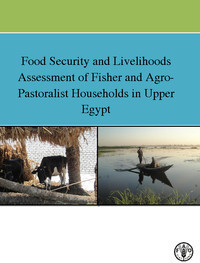Food Security and Livelihoods Assessment of Fisher and Agro-pastoralist Households in Upper Egypt
By
Lori Curtis, Irene Omondi, Hesham Khalifa and Ahmed Salem
Regional Office for Near East and North Africa, Cairo, 2014
Preface
This work is the result of a collaborative effort and fieldwork in Upper Egypt, with the goal of highlighting the challenges faced by communities and livelihoods that are often overlooked in mainstream development projects. This field study draws attention to the context and challenges that are unique to fisheries and agro-pastoralist living in governorates in Upper Egypt; an extremely vibrant and culturally rich area, while at the same time experiencing some of the highest levels of poverty in the country.
The People living in the governorates in Upper Egypt are known as being particularly poor, with the majority of people relying on food production and marketing systems as a predominant source of livelihood. This is particularly critical as they are not only producing food for their own households, but also for households throughout their communities, and in some cases for households throughout Egypt. While not uncommon among agricultural communities, the high levels of poverty among those supplying the country with the food they need to survive is unacceptable and the importance in addressing this is becoming increasingly urgent. The majority of those involved in the agriculture sector in Upper Egypt are small-scale producers, with their households and family being very integrated into livelihood; making it neither easy nor necessarily desirable to separate households and household members from the livelihood sustaining it. Consideration of these small-scale fishers and agro-pastoralists in a holistic manner, while understanding and incorporating the dynamic nature of these livelihoods and households, will be key to the success of these interventions. Important factors for fishers and agro-pastoralists in Upper Egypt that should be considered include the varied and changing sources of households income as well as the extremely important role woman play in these households and livelihoods, despite the fact that their work is not always clearly visible and subsequently valued.
The information gathered during this field study would not have been possible without the kind time and patience of those fishers and agro-pastoralists who sat in focus groups for hours, and all those who assisted in bringing together these people.
Contents
Introduction
- Rationale
- Purpose and Objectives
- Methodology
Description of the Current Situation
- Fisheries and Aquaculture
- Livestock
- Markets and Livelihoods
Implications for Livelihoods and Food Security
Conclusions
Recommendations
- Fisheries
- Livestock
- Markets and Livelihoods




ساحة النقاش